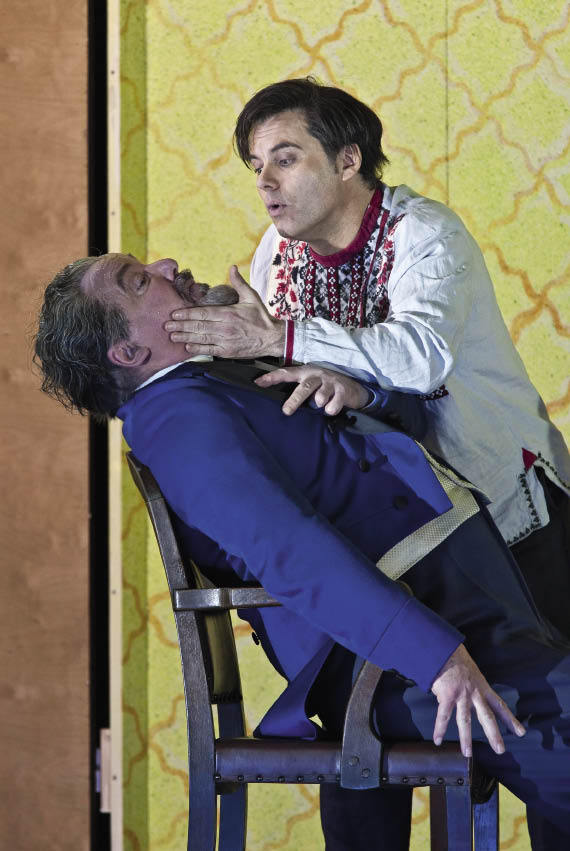Prokofiev’s opera The Gambler adapts Dostoevsky’s novella of the same name, an audacious enterprise.
Prokofiev’s opera The Gambler adapts Dostoevsky’s novella of the same name, an audacious enterprise. Unfortunately, it fails, as I think all the composer’s operas do, apart perhaps from The Love for Three Oranges, and mainly because he gives no evidence of interest in individual human beings, and hence of the musical means which he might develop to express their individuality. War and Peace is Prokofiev’s most spectacular failure in that respect, but the war scenes do something to salvage it. There are no compensations in The Gambler, so what is quite a short opera, a bit more than two hours, comes across as a long, stagnant one. And the stagnancy is the more pronounced for the ceaseless bustle that we are witnessing. Not surprisingly, since the setting is mainly a casino, people rush in, worrying about their losses before they go on to lose a lot more; indulge in hysterics on various subjects — for the opera is concerned with the twin addictions of gambling and lust-cum-love; and pass out, insult, exit rapidly, make all kinds of scenes. Meanwhile, the music carries on mainly by means of motor rhythms and ostinati, but without a sense of forward movement.
Prokofiev’s idea was to write a kind of opera in close relationship to everyday speech, as Mussorgsky had done, often triumphantly, and as Janacek was in the process of doing, almost always with consummate success. Prokofiev fails miserably, partly because, unlike those other two composers, he creates no memorable music. Every now and then there is a characteristic tiny flood of lyricism, but only for a bar or two, and as a tease, before we are hurried back to the chattering. The characters are not interesting, almost all of them mere grotesques, and what they have to say — a very great deal, since garrulity seems to go with their addictions — is uninteresting, too.
It’s almost more disheartening to see a bad opera done well than done badly, for one has the added sadness of thinking what the resources available could have been used for, and how they are being wasted. The team of performers that has been assembled at the Royal Opera is an impressive one, and the central role of Alexei is so well sung and acted by Roberto Saccà that he almost engages the interest. His interest is in Polina, a tricky role which Angela Denoke acts convincingly, but finds difficult to make much of vocally until the final scene, when she rejects Alexei and his astonishingly won wealth. John Tomlinson, now a superb character actor, makes a meal of The General, without managing to hide the silliness of the role. And one has to say the same for the rest of the remarkably starry cast, not a weak link, but all to no purpose.
Richard Jones is an expert in this kind of thing. The sets, designed by Antony McDonald, have a seedy lavishness which reflects the clientele of Roulettenburg, the fictional spa where the action is located; and Jones enjoys, always, getting people to behave like demented puppets. He likes, too, making us wonder whether we should be laughing or crying; but I’m sure he can’t want us to be yawning, which is the only reaction this opera provokes.
After the dazzling musical success of last week’s Lucia di Lammermoor, I had high hopes of ENO’s new The Elixir of Love, directed by Jonathan Miller. No surprise that he set it in Adina’s Diner in the Midwest in the 1950s, as plausible a setting for it as any other, if a shade conventional. But he did nothing with it. The cast uniformly failed to provide American accents, and several of them didn’t try, which was much wiser. Inventive direction was as sparse as in last year’s Bohème, the characters simply hang around. Humour is provided by a queue of women dying to use the lavatory, which flushes noisily after each visit.
Kelley Rourke’s English ‘adaptation’ is not a success. ‘Una furtiva lagrima’ becomes ‘I saw a tear fall silently’. When did anyone see a tear fall noisily, and what is wrong with ‘secretly’, which is what is meant? Still, that lovely aria was well sung by John Tessier, but it does come late in the opera, and before that there hadn’t been a lot of musical distinction. Sarah Tynan goes in for a pert, shrill characterisation of Adina, and even Andrew Shore, Bayreuth’s current Alberich, is only a so-so Dulcamara. What is lacking, in every aspect, is charm, and that is the pervasive feature of this adorable good-natured opera. Future revivals may contain it: there is nothing in the production which actively prohibits it, but in comparison with Lucia this was musically characterless, and a dramatic non-starter.






Comments